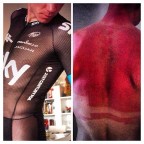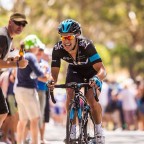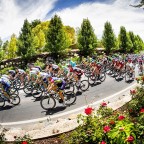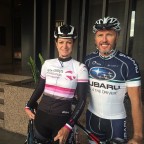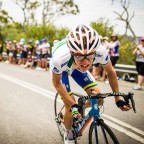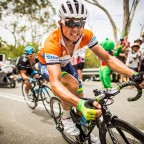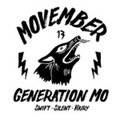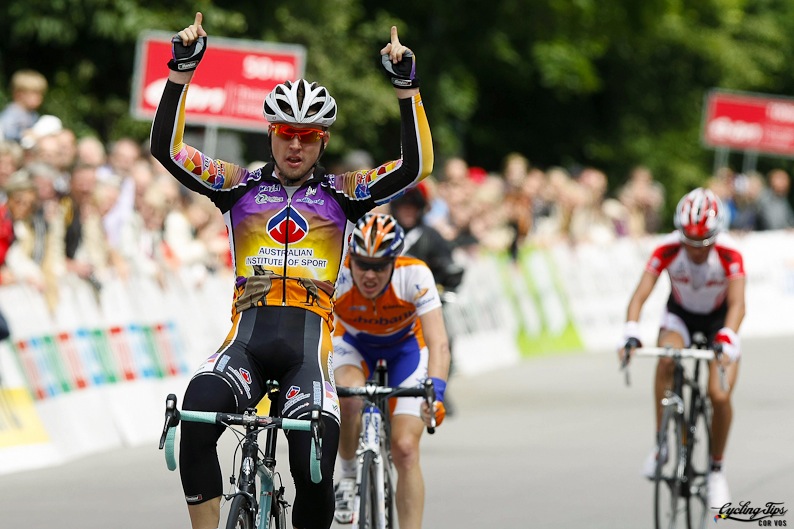The start of the season always throws up a few surprises. We see talents like Tom-Jelte Slagter come out of nowhere. We see confirmed talents like Mark Cavendish asserting his dominance. Refreshingly, we also see steady rising talents like Leigh Howard smash through that invisible ceiling that seems to have been limiting him in the past.
Ever since his junior track days Howard has been earmarked as the next big thing. During the 2007 Melbourne Cup on Wheels Howard stunned the crowd and silenced the ever ‘showy’ Graeme Brown as he came storming past for the victory. VIS coach and national selector Dave Sanders turned to me that night and said, “This kid is going to be special.”
Special. That was a word we heard a lot of. As Howard went on to take victories on the road and the track be it in Australia or abroad we all started to see just what Davo meant.
Howard’s career trajectory has a prophetic similarity to that of the Manx Missile and his start to this season sees that path continue to point sky high. Last week Howard stole victories from other big name pros such as Farrar, Ventoso, Petacchi and Hunter to claim victory at the Trofeo Migjorn and the Trofeo Platja de Muro during the four race series known as the Challenge Mallorca.
With his name back in the spotlight, we thought it would be timely for readers to get to know Howard a little better. So over Skype we sat to discuss with Howard where he has come from, where he’s going and his thought process throughout the journey. Enjoy
Jono Lovelock (For Cyclingtips): G’day Leigh and thanks for having a chat with us. You’ve now experienced cycling from all angles. Road, track, juniors, seniors and so on. For you, which part of your cycling career has been the most enjoyable?
Leigh Howard: “As long as you can see an improvement you always get enjoyment. I just couldn’t pick one point that was the most enjoyable. Back in the junior days, you got a different sort of enjoyment out of racing. Every single race you went in whether it was a race that suited you or not, you enjoyed it and you tried as hard as you could. Whereas now, it’s more selected.For example: mountain days, they’re not going to be the most enjoyable for me you know! But when you do a sprint day it’s pretty exciting stuff, especially when you win.”
CT: What are your thoughts on the Australian races, with so many double stages and crits, do you think they did enough to prepare you for a European career or do you think a more European approach would be a good move?
LH: “Certainly the style of racing is beneficial in every sense. Doing all the criteriums … well just look at the amount of people that have come out of the Australian system that have turned into not just sprinters but people who are quite fast and still know how to handle their bikes. You look at guys like Nathan Haas who isn’t a ‘sprinter’ but he still knows how to handle himself in a bunch and can finish off a race.”
CT: Back in the VIS days when we were team mates, I had this clear feeling when racing and riding the front that I was more than happy to completely bury myself because I knew you would get the job done. With that in mind, do you feel a lot of pressure as a sprinter to return the favour and get the job done?
LH: “A bit of both. I guess the key to being a good sprinter, which I haven’t got down pat yet, is learning to feed off that pressure. Cav’s a perfect example of that now. He feeds off that pressure of the whole team working for him for 200km and he feels like he has to finish it off. For me, it’s pretty hard sometimes. They say the job of a sprinter is physically one of the easiest, ‘you’ve only got to sprint for ten seconds’. But for anyone who’s raced a bike they know that’s not true! The mental pressure is immense. You’ve got eight guys all sacrificing their entire race for you.”
CT: Do you get a similar motivation on a mountain day when you’re working for the climbers?
LH: “Oh definitely. And there’s a really good feeling within GreenEDGE because we have such good camaraderie. If it’s a mountain day I’m going to do everything I can to get my man to the front of the bunch at the bottom of the main climb and make sure that he doesn’t have to use any extra energy. As everyone knows, what goes around comes around and I’m going to need his help on the sprint days!”
CT: With that ‘camaraderie’ in mind, can you empathise with Bobridge and his move to Blanco? Specifically his citing of a ‘need’ to get away from the GreenEDGE ‘boys club’?
LH: “Yeah I can. He’s spent a lot of time, more than me, in ‘the system’. Because he did team pursuit work for the Olympics he spent a lot more time in the Australian system, like really ‘deep’ in it. Whereas I was with Highroad for two years which was quite separate … we had a couple of Aussies but they weren’t sort of part of ‘boys club’ or so you say. But with Jack, there’s been a group that’s gone around that he’s been a part of for a long time. I actually had dinner with him last night and he’s in really good spirits and I think he’s going to have a great season”
CT: Back when you were a part of that group (Travis Meyer, Cam Meyer, Bobridge, Howard, O’Shea, Dennis, Hepburn, Mathews and so on) in your AIS days and you were all chasing PRO contracts was there a bit of pressure and competition going on? Or were you all best of mates?
LH: “Yeah it was fairly intense. We weren’t particularly competitive against each other but I think that’s because we were all really lucky in the sense that we got good exposure and we got picked up by our respective teams pretty fast. I was already talking to Highroad by the fifth month of my first year of U23s. Certainly now as there are less and less spots becoming available with the state of WorldTour cycling I dare say the boys [in the AIS] are fighting a bit harder against each other. It’s not always the best thing. But sometimes that’s the way it goes”
CT: At that stage did you have a separate manager working for you or was it just the AIS talking to PRO teams for you?
Howard: “No I didn’t have a manager then. I was first contacted by Allan Peiper on behalf of HTC-Highroad soon after the Track Worlds. [Where Leigh claimed silver in the team pursuit and madison] Then the AIS and Scott McGrory [VIS track coach amongst other roles] helped me out with some negotiations and the finer details.”
CT: Following on from your track days, and in the same vein as all the Aussie crits, do you feel the six day track races have helped you hone your sprinting ability?
Howard: “The track I think can have a lot of benefits for sprinting, I mean physically there is so much leg speed involved in the six day races. I know a lot of the Europeans go back and do six days, guys like Jens Mouris and Nicki Terpstra gain a lot out of the track [Erik Zabel was a regular 6 day racer]. But from a mental point of view I think growing up as a junior and the type of racing I did had a huge influence on my sprinting, and not so much the six days now. It’s a completely different ball game; flicking around a 200m track compared with sprinting at 70kph in a bunch of two hundred.”
CT: I remember back in 2009 I saw you for the first time in ages and you said to me “Geez you’re looking pretty lean.” Man I was chuffed *laughter*. But I thought, geez, ‘have you seen yourself lately?’ That year you seemed to shed a lot of weight coming into the U23 Worlds in Mendrisio. Even though your climbing was good during that period, did not finishing the road race make you decide to put a bit of muscle back on and really focus on sprinting?
Howard: “I think I always knew I was going to be a sprinter on the road. But pretty much from the middle of that year from when I returned from Europe I lost a lot of weight really fast. Now looking back it was certainly not ideal. In saying that, for a short two month period following I had really good results, I was climbing hills really well. In the first part of that year my objective was to ride well enough so that the AIS would select me to come back to Europe for the second half of the year. Once I got selected my next goal was to try and get selected to race the Worlds. And then I was going so well I ended up leading the team in the Worlds in Mendrisio which was basically a race made purely for climbers [We all remember how well Cadel climbed that year…] “
CT: If you don’t mind me asking, how much weight did you loose and what did you get down to?
LH: “I lost five kilos in one month … maybe only three weeks actually. For a large person it’s not massive but I was never fat in the first place! I remember seeing myself down around 67kg. To put that in perspective now I am racing at around 71-72kg [Howard is 176cm or ~5.8 feet tall]”
CT: And it wasn’t long after those road worlds in 2009 where you came out loaded with extra muscle and flew past Bennati and Boonen and won a stage at Tour of Oman in early 2012. That must have felt pretty good? Had you changed anything in your preparation for your neo-PRO season?
LH: “Yeah that was it! I’d come off a lot of track preparation and I’d managed to hold onto a lot of that fast twitch ability. Before that in 2009 I think I really lost a lot of that fast twitch ability when I got so obsessed about weight and trying to climb hills well instead of focusing on my strength which is to sprint fast. In that off season [09-10] it was putting weight back on and leading into the Australian track nationals that did it for me. Presently, in the last six months I’ve just gone back to basics and I’m not worrying about my weight at all. I’m doing a lot of sprint training, not as many massive kilometres as I used to do and some harder work in the gym and it’s already paid off.”
Leigh Howard winning the fourth race, Trofeo Serra de Tramunta, in the 2013 Challenge Mallorca series.
CT: So you definitely felt like you turned some heads last week in Mallorca?
LH: “Oh yeah, I hope so! * laughter* Hopefully I can keep turning heads and have a good year”
CT: Within GreenEDGE there’s now yourself, Allan Davis, Michael Mathews, Aidis Kroupis and Matt Goss. Do you get told by the team which races you will be able to target as lead sprinter or does it depend on your form at the time?
LH: “Half and half. I’ve got my race program now, so for instance when it said ‘Challenge Mallorca’ on my program it was also written down in brackets that I was the designated sprinter. The same goes for Paris-Nice. I don’t know off the top of my head but as an example it might say for the Dauphine that I am down as the lead out man for Matt Goss … Actually for Tour of Turkey I’ll be leading out Matt Goss so in the lead up I’ll practise lead outs and longer sprints.”
CT: Aside from your training, you are based in Girona around loads of other cyclists and other Aussies, do you guys get together a fair bit? Does it ever get a bit rowdy?
LH: “Unfortunately most of the time we are busy racing or training. But at least for those guys who don’t do the tour everyone has about a week off in the middle of June. So then everyone takes off somewhere. Last year I went down to just below Barcelona with Chris Sutton and his girlfriend and my ex-girlfriend and just sat by the beach. But not much partying goes on here … it’s sort of ‘business’. I move between here and Andorra now, in fact I probably spend more time in Andorra than Girona now.”
CT: On the travel note. Most guys get pretty homesick during the year, so for you, what’s a better feeling; winning a race or returning home to Australia for the start of the ‘Offy’?
LH: “That’s a tough one … winning a race I’d say though! My life is basically over here now so returning to Australia is good but I’ve sort of got it in my mind now that this is home and my job is to win races and that’s what I love doing.”
CT: What’s been your most enjoyable race so far?
LH: “Probably Tour of California, I’ve loved that race the last couple of years. I’ve always had pretty good form going into it … Unfortunately I still haven’t picked off a stage win yet, damn Peter Sagan always seems to be there to pip me on the line! *laughter* “
Leigh Howard and Cameron Meyer celebrate their win during the Madison race in the 2010 World Track Championships (Copenhagen, Denmark).
CT: Aside from your cycling life, tell us a bit your other passions. You’ve completed a trade and you and your brother even bought and designed a house. Are you a jack of all trades?
LH: “Yeah we didn’t build the house per se but we got a loan and went about getting it built. Recently I bought his half off him so it’s now just my house. My brother and I actually both worked as auto-electricians with our old man, so I did that for three years before I started travelling full time.”
CT: Do you think if you weren’t so heavily invested in cycling you would be doing that instead?
LH: “I don’t think so to be honest. It was always good working with dad and working within the family. But I think if I was never a cyclist I’d either be in some other form of sport or working with wood as a cabinet maker. That was always a passion of mine”
CT: Now in regards to family, your mother Kym Howard is a pretty serious coach in Victorian circles. I always had these ideas in my head that she would have you out motor-pacing for hours and hours on rainy days. Or you two would always be squabbling like a mother and son generally do, but more so about training matters than the usual mother-teenager battlers. Is this so or is my imagination far too vivid? Was it like having a part time mum-part time coach or did she keep her distance?
CT: “Far, far too vivid! She kept her distance so she was definitely a full time mum! I’ve always had my own coaches from the days of Brad Robbins when I was young then on to Dave Sanders and Scott McGrory and now Marc Quod. I guess mum’s always kept her distance as she knows I wouldn’t have listened to her anyway!”
Lovelock: Well that’s a wrap, thank you Leigh and best of luck for the rest of the season. We’ll be keeping an eye out!
